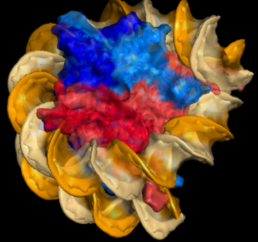Research Focus
Mission: The biogenesis and function of the nucleosome landscape
The Mueller-Planitz lab studies the core components of chromatin – the nucleosomes and the machinery that places them in the genome. Nucleosomes are crucial to human health. Aging, for instance, disrupts the nucleosome landscape, destabilizing the genome, and mutations in nucleosomes are drivers of cancers. Nucleosomes serve both as barriers that restrict access to the genome and as a medium to accumulate epigenetic marks. Correspondingly, the locations of nucleosomes in the genome are precisely controlled by so called nucleosome remodeling complexes. Remodelers move, assemble, or eject nucleosomes in an ATP-dependent fashion. Some also even the spacing between nucleosomes, setting a characteristic nucleosome-to-nucleosome distance. These ‘spacing remodelers’ thereby generate arrays of nucleosomes with a surprising regularity, and these arrays are conserved throughout eukaryotes. Their function however remains elusive.
The overarching aim of the Mueller-Planitz lab is to elucidate the biogenesis of the nucleosome landscape and dissect its biological function under physiological and pathological conditions. To achieve this goal, his lab bridges methodologies of molecular biology, genetics, genomics, biophysics, structural biology, and enzymology. They develop cutting-edge technology to visualize individual nucleosome patterns in single cells, and to dissect the mechanism of nucleosome remodelling genome-wide in vivo and in vitro.
Nucleosomes have recently been shown to phase separate, raising a host of fundamental biological questions. For instance, can enzymes that operate on DNA and nucleosomes freely enter chromatin condensates, or are they excluded? (How) can enzymes operate in chromatin condensates? Are they differently regulated in such an environment? Can their activity dissolve condensates or induce their formation?
The Mueller-Planitz lab is addressing these and similar questions using high-end microscopy, incl. FLIM-FRET, quantitative biochemistry and computational simulations.
The Mueller-Planitz is always looking for highly motivated and creative students and postdocs
Students interested in a master’s project with a focus on molecular biology, biochemistry, genomics or biophysics are encouraged to apply.
Students interested in a PhD project should apply to the Dresden International Graduate School for Biomedicine and Bioengineering (DIGS-BB).
We are also supporting fellowship applications of outstanding postdoctoral researchers who wish to join our lab. Funding is available through various organizations (Humboldt foundation, HFSP, EMBO, DAAD, etc.).
In case you are interested in joining the lab, get in touch with Felix Mueller-Planitz!
Current news by this research group
Nothing found.






